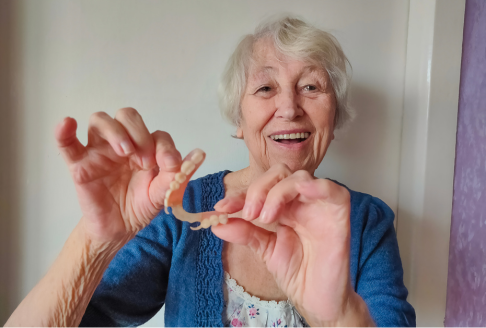Food tips for people with dentures
- 30 Apr 2024

If you have dentures, you may feel apprehensive about eating some of your favourite foods, especially if they are chewy or require you to bite into them.
Here’s some tips to help you make the transition to eating with dentures easier. From some ideas for softer options to how to manage a gradual re-introduction to solid foods – we’ve got you covered.
Ease into solid foods
Take some time to get used to your new dentures and avoid rushing back into eating solid food straightaway. Start with softer food options and build your confidence before trying your favourite solid foods.
Eat healthy, soft foods
While it’s easy to feel overwhelmed by the list of foods you can’t eat when wearing dentures, it’s important to remember there are a lot of healthy and soft options you can still enjoy. For example:
- Soft, ripe fruit (bananas, mangoes, oranges, etc.)
- Steamed, boiled or roasted vegetables (broccoli, carrots, zucchini, sweet potatoes, etc.)
- Slow cooked or mince meats (ground beef, chicken, turkey, etc.)
- Smooth spreads and dips (hummus, cream cheese, guacamole, etc.)
Other soft foods you might like to eat include scrambled eggs, soups, broths and smoothies.
Exercise caution with hot foods and drinks
Keep in mind that hot foods and drinks can burn your mouth more easily when you have dentures because dentures can hinder your ability to gauge temperature effectively. Try to test the food or drink against your lips first, before you take a bite or sip.
Cut up your food and take small bites
To avoid putting excessive pressure on your dentures, cut up your food into smaller pieces. Taking small bites also helps distribute the force evenly and prevents discomfort. Chew slowly and deliberately across both sides of your mouth.
Some things to avoid …
Sticky hard foods like toffees, caramels, marshmallows, peanut butter and raisins can adhere to your dentures and dislodge them. Be careful with nuts and ice cubes which can put stress on your dentures and potentially cause damage to them.
Some last quick tips
Avoid using your front teeth to bite into food. Instead, focus on cutting up food into smaller pieces which you can put directly into your mouth, using your back teeth to chew.
Remember, proper care and maintenance of your dentures is essential to their longevity. Regularly clean them, remove them at night and visit your dental professional for adjustments and further advice as needed.
Community news
-

Back to School Tips for Foster and Kinship Carers
Heading back to school can be exciting, but it can also bring up big feelings—especially for kids in care. Here are a few simple ways to help make the transition smoother.
- 17 Apr 2025
-

Easter Reflection from Emily Booth of our Spiritual Care Team
A few years ago, at Easter, I was staying with my sister and her family for the weekend. One afternoon we were all sitting around chatting and the kids were playing when my sister came into the room and placed a tray of fresh, warm hot cross buns on the table
- 16 Apr 2025
-

Student Volunteer Spotlight - Erin
Did you know that Baptcare has student volunteers at some of our Residential Aged Care communities? Our volunteers are an integral part of our Baptcare community, not only in residential aged care but across many of our programs and services. Volunteers provide essential connection, positivity and assistance to residents, clients and consumers.
- 04 Apr 2025
